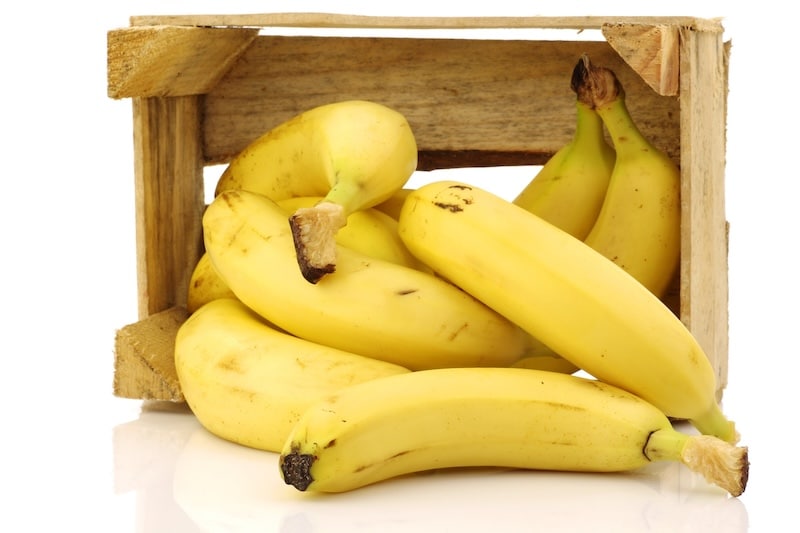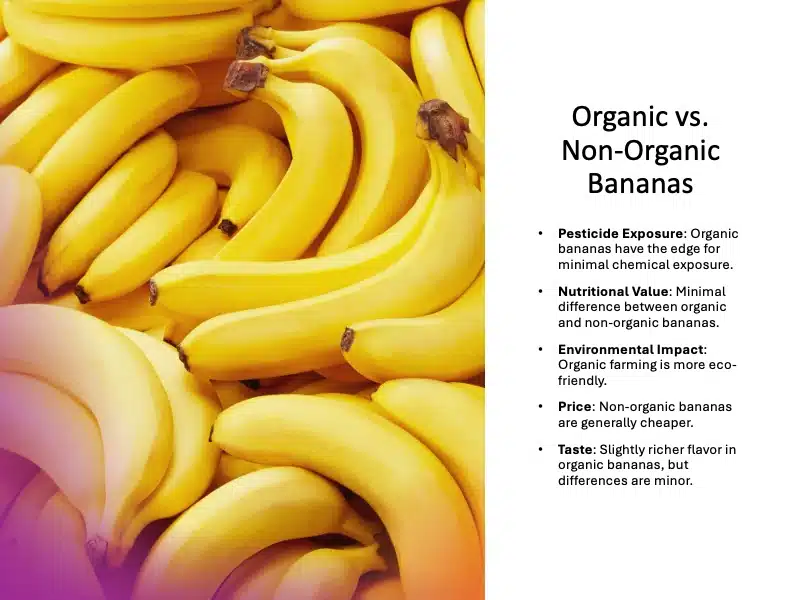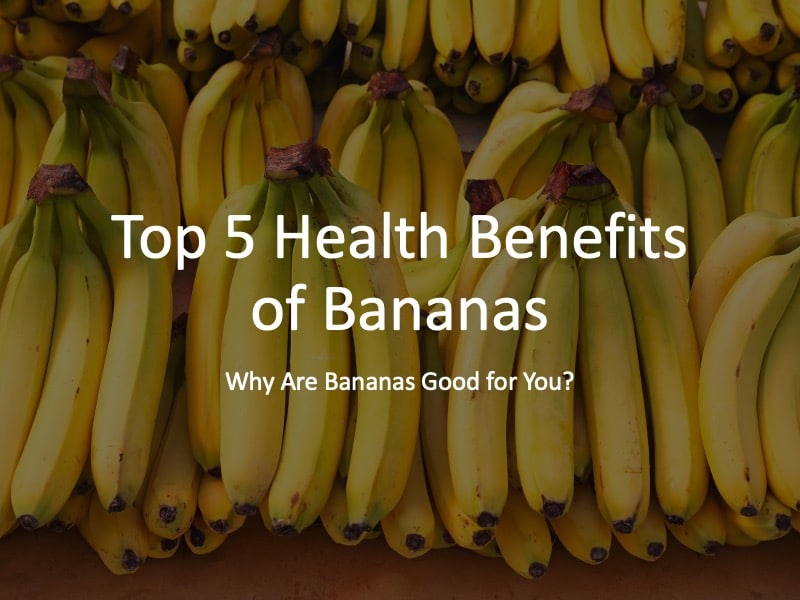Top 5 Health Benefits of Bananas: Are Bananas Good for You?
Bananas are one of my favorite foods, and I’m constantly adding them to my smoothies or enjoying them as a quick snack. I particularly appreciate bananas for their role in preventing muscle cramps and aiding in workout recovery, but there are several other imporant health benefits of bananas as well.
As a professional athlete, I rely on them to support my body’s needs before, during, and after intense training sessions.
Like myself, many people worldwide love consuming bananas, as they are appreciated for their delicious taste, versatility, and impressive nutritional value.
More than just a convenient snack, they are packed with essential nutrients and bioactive compounds that support heart health, aid digestion, boost energy, and aid muscle recovery.
These benefits make bananas a powerful addition to any diet, especially for athletes.
Most people can safely consume one to two bananas daily, although those with specific health concerns should consult their healthcare provider.
This article explores the nutritional profile of bananas, their health benefits, ideal daily intake, who might need to limit them, and the differences between organic and non-organic options. Whether eaten fresh, blended into smoothies, or used in cooking, bananas offer numerous health benefits that enhance overall well-being.
Nutritional Properties of Bananas

Bananas are packed with essential nutrients, including vitamins, minerals, and bioactive compounds. One medium banana (about 118 grams) provides approximately:
- Calories: 105
- Carbohydrates: 27 grams
- Fiber: 3 grams
- Sugar: 14 grams (natural sugars like fructose, glucose, and sucrose)
- Protein: 1.3 grams
- Fat: Less than 0.5 grams
Bananas are also rich in potassium (around 422 mg per medium banana), which plays a crucial role in maintaining heart health, muscle function, and electrolyte balance. Furthermore, they contain vitamin C, vitamin B6, magnesium, manganese, and antioxidants like dopamine and catechins, which contribute to their overall health benefits (Singh et al., 2016).
Health Benefits of Bananas
Bananas are not only delicious and versatile but also a potent source of nutrients that support heart health, digestion, mood regulation, and especially muscle recovery and cramp prevention.
Along with the health benefits of bananas listed below, bananas are also a natural source of antioxidants like vitamin C, which helps protect the skin from damage and promotes collagen production.
Additionally, the presence of magnesium and manganese in bananas plays a significant role in maintaining bone density and strength. Bananas also aid in the absorption of calcium, further supporting bone health (Mathew & Negi, 2017).
By including bananas in your diet, you can enhance physical performance, reduce exercise-related muscle cramps, and support overall well-being. Whether you choose organic or non-organic varieties, bananas remain a powerful addition to any diet for athletes and non-athletes alike.
1.) Supports Heart Health
Bananas’ high potassium levels are essential for regulating blood pressure and reducing the risk of cardiovascular diseases. They help balance sodium in the body, which is crucial for maintaining healthy heart function.
2.) Aids in Muscle Recovery
Bananas play a significant role in muscle recovery by replenishing muscle glycogen stores after exercise, which is why they are one of the best carbs for bodybuilders and athletes. They are a great source of easily digestible carbohydrates, which boost energy and support muscle protein absorption, ultimately aiding recovery (Sarma et al., 2021).
3.) Enhances Mood and Reduces Stress
The vitamin B6 found in bananas plays a role in neurotransmitter production, which is crucial for regulating mood and reducing stress. This natural boost can help you feel more balanced and energized throughout the day.
4.) Boosts Digestive Health
The dietary fiber in bananas supports digestive health by promoting regular bowel movements and preventing constipation. The resistant starch found in green bananas acts as a prebiotic, feeding the beneficial bacteria in your gut and enhancing overall digestive health.
5.) Natural Energy Booster
Bananas are an excellent energy source due to their carbohydrate content. Consuming a banana before or after a workout can provide sustained energy, making them a perfect snack for athletes and active individuals.
How Many Bananas Should You Eat a Day?

For most people, consuming one to two bananas per day is ideal. This amount provides essential nutrients without causing excessive intake of calories or sugar. Active individuals, especially athletes, may consume more bananas to replenish energy and electrolytes lost during exercise.
However, eating too many bananas may lead to hyperkalemia (excess potassium in the blood), which can affect heart and kidney function.
Should Anyone Avoid Bananas?
While bananas are generally safe, some individuals may need to limit their intake:
- People with Kidney Problems: Those with impaired kidney function may struggle to regulate potassium levels, leading to potentially harmful effects.
- Latex-Fruit Allergy Sufferers: Rare cases of latex-fruit syndrome can cause allergic reactions to bananas.
- Individuals with Diabetes: Although bananas have a low glycemic index, their carbohydrate and sugar content can affect blood sugar levels. Diabetics should consume them in moderation and pair them with protein or healthy fats.
Organic vs. Non-Organic Bananas

Here are a few factors to consider when choosing between organic and non-organic bananas:
- Pesticide Exposure: Organic bananas are grown without synthetic pesticides, making them a safer option if you want to reduce exposure to chemical residues. While non-organic bananas have thick peels that protect the inner fruit from most pesticides, organic options still offer an added layer of safety for those concerned about chemical intake.
- Nutritional Value: Studies show that the nutrient content of organic and non-organic bananas is nearly identical. Both types provide the same vitamins, minerals, and antioxidants, so from a nutritional standpoint, there isn’t a significant advantage to choosing organic bananas over their non-organic counterparts.
- Environmental Impact: Organic banana farming practices are more sustainable and eco-friendly, promoting soil health, biodiversity, and reduced chemical runoff into the environment. Organic methods are designed to work in harmony with nature, making them a more environmentally responsible choice.
- Price: Organic bananas are typically more expensive than non-organic bananas due to higher production costs associated with organic farming methods. These include more labor-intensive practices and the use of natural fertilizers and pest management techniques. If cost is a significant factor, non-organic bananas can be a more budget-friendly option.
- Taste: Some people claim that organic bananas have a richer, more robust flavor compared to non-organic varieties. However, taste differences are often subtle and can vary depending on individual preferences and the ripeness of the banana. The difference in taste might be more noticeable in organically grown bananas because they often come from smaller farms with specific growing conditions that enhance flavor.
Choosing between organic and non-organic bananas ultimately depends on your priorities regarding health, environmental impact, and budget.
Both options provide excellent nutritional benefits, but organic bananas might be worth the extra cost for those focused on reducing pesticide exposure and supporting sustainable farming practices.
Why Do People Think Bananas Are Bad for You?
Despite bananas being a highly nutritious fruit, several myths and misconceptions make some people think they are bad for you. Here are some common reasons why people think bananas are bad for you:
- High Sugar & Carb Content: Bananas contain about 14 grams of natural sugar and 27 grams of carbs per medium fruit, which can be a concern for those on low-carb diets or managing blood sugar levels. However, the fiber in bananas helps slow sugar absorption, preventing rapid spikes in blood glucose. For most people, these carbs provide valuable energy, especially beneficial for athletes and active individuals.
- Potential to Cause Weight Gain: Some people mistakenly believe that bananas lead to weight gain due to their calorie content (about 105 calories per medium banana). While bananas do have more calories than some other fruits, they are also more filling and nutritious. Bananas can actually support weight management when included in a balanced diet, as they help reduce cravings and provide sustained energy.
- Impact on Digestion: Bananas, especially when eaten in large amounts, can cause digestive discomfort like bloating and gas due to their soluble fiber content. People with digestive issues like irritable bowel syndrome (IBS) might avoid bananas because of their potential to cause discomfort. Moderation and choosing ripe bananas can help reduce these issues.
- Concerns About Potassium Levels: Although rare, excessive consumption of bananas can lead to a condition called hyperkalemia, where potassium levels in the blood become too high. This is mainly a concern for individuals with kidney problems, as their kidneys may struggle to remove excess potassium efficiently. For most people with healthy kidneys, this is not a significant concern.
- Environmental and Ethical Issues: Some people avoid bananas due to concerns about their environmental impact and the ethical practices of large-scale banana production. Non-organic banana farming is often linked to pesticide use, habitat destruction, and poor labor practices. Choosing organic and fair-trade bananas can help address these concerns.
Overall, these concerns are often exaggerated, and bananas are safe and beneficial when eaten in moderation as part of a balanced diet.



